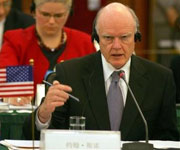 |
| U.S. Secretary of Treasury John Snow makes his opening remarks during the 17th session of the China-US Joint Economic Committee for the opening ceremony in Xianghe, China, Sunday, Oct. 16, 2005. |
Treasury Secretary John Snow and Federal Reserve Chairman Alan Greenspan were leading talks with China on Monday on economic issues - including what the U.S. side said was a proposal by Washington for broad reforms to counter Beijing's huge and growing trade surplus.
The meeting of the U.S.-China Joint Economic Commission, which began Sunday, followed a weekend gathering outside Beijing of financial leaders of the world's leading economies that focused on coping with high oil prices and other risks to global growth.
U.S. officials said they would press Beijing to move faster on easing controls on the yuan, which critics say is undervalued by as much as 40 percent, pushing exports higher and contributing to a bilateral trade imbalance that topped US$162 billion last year.
But they also said they want to expand the dialogue to include a wider range of reforms of its economy and financial markets.
Greenspan is revered in China as an economic mastermind. China's official Xinhua News Agency described him as the "star" of the financial summit.
"The Chinese have every reason to care so much about Greenspan's visit," Xinhua said. "Almost everyone knows that whatever conclusion Greenspan draws up after his China visit would certainly have its impact."
However, Greenspan kept to his plan to make no public comments during his visit.
The meeting of the U.S.-China Joint Economic Commission is the 17th since the forum was founded in 1979 tothrash outeconomic issues. It was due to end Monday.
Snow and other officials said they were planning to lobby Beijing to open its financial and other markets wider to foreign firms and to carry out reforms to encourage more domestic demand and reduce the Chinese economy's dependence on exports.
"If we truly want to deal with these imbalances bilaterally or multilaterally, you need to focus on more than just the currency," U.S. Treasury Undersecretary for International Affairs Tim Adams told reporters.
The U.S. Treasury hopes that by putting more emphasis on China's financial reforms, it can call attention to the progress China has made in this area while also encouraging it to open wider to foreign competition.
"It does indeed help us to work with Congress to explain theenormityof the reform effort that needs to be undertaken here and how many of these things work together," Adams said.
The U.S. side also planned to present a statement on priorities for building China's financial system that calls for established foreign banks, insurance and securities firms to be eligible to set up multiple branches on the same terms that domestic firms do.
Washington also wants China to remove the US$10 billion minimum requirement in assets that restricts the ability of foreign institutional investors to buy domestic securities, and to end foreign ownership caps on financial institutions and allow 100 percent foreign ownership of subsidiaries.
"To the extent that China succeeds in building its capital markets, it will increase the size of the Chinese economy and the world economy as well," said Christopher Cox, chairman of the U.S. Securities and Exchange Commission.
Cox said he would seek closer cooperation with China's financial regulators, including initiatives to help train Chinese stock regulators and work together on investigations into market abuses.
But U.S. officials said they do not plan to ease pressure on China to allow more currency flexibility.
Chinese officials say they cannot move any faster in currency reforms after having revalued the yuan by 2.1 percent in July, at the same time giving up a decade-old peg to the U.S. dollar and switching to a basket of major currencies that also includes the Japanese yen and euro. The currency has gained only about 0.3 percent in value since then.
(Agencies)
|
